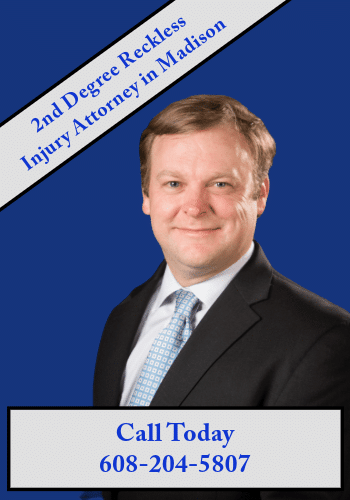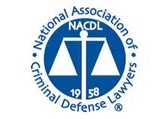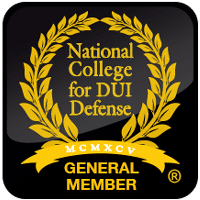Second Degree Reckless Injury Charge in Wisconsin
- Our Location
Madison, WI
- Free Consultations
(608) 204-5807
Madison, WI Second Degree Reckless Injury Attorneys
Understanding Second Degree Reckless Injury in Wisconsin
A charge of second degree reckless injury is a serious legal matter in Wisconsin, reflecting the state’s firm stance on violent crimes. Under Wisconsin Statute § 940.23(2), a conviction for this Class F felony carries severe consequences, including:
• Up to 12.5 years in prison
• Fines of up to $25,000
• A permanent felony record
Given the gravity of these penalties, it is critical to secure an experienced criminal defense attorney to protect your rights. At DK Anderson, S.C., we have extensive experience handling violent crime charges, including second degree reckless injury, and are prepared to provide aggressive legal representation to defend your future.
Second Degree Reckless Injury Attorney in Madison, WI
Determining what qualifies as criminally reckless behavior is not always straightforward. While some cases may involve clear reckless actions, others hinge on subjective interpretations of conduct, intent, and the severity of injuries.
At DK Anderson, S.C., we understand the nuances of these cases and know how to challenge prosecutorial arguments regarding recklessness. Our Madison-based defense attorneys have successfully defended individuals accused of second degree reckless injury by:
✔ Analyzing the prosecution’s evidence for weaknesses
✔ Challenging witness testimony and forensic findings
✔ Questioning whether the injuries meet the legal standard of ‘great bodily harm’
✔ Presenting alternative explanations for the alleged reckless behavior
✔ Negotiating reduced charges or seeking case dismissal
If you are facing a second degree reckless injury charge in Madison, WI, contact us immediately to begin crafting a strategic defense.
Speak with a Top-Rated Defense Attorney Today
What the State Must Prove for a Conviction of Second Degree Reckless Injury
In Wisconsin, to secure a conviction for second degree reckless injury, the prosecution must prove two key elements beyond a reasonable doubt:
1. Great Bodily Harm
The injuries inflicted must be classified as great bodily harm, which means:
• A substantial risk of death
• Serious permanent disfigurement
• Loss or impairment of an organ or bodily function
If the injuries do not meet this legal threshold, the charge may be reduced to a lesser offense.
2. Criminally Reckless Conduct
The defendant’s actions must have:
• Created an unreasonable and substantial risk of death or great bodily harm
• Been committed with awareness of that risk
The prosecution must establish that the accused was not just negligent, but acted with recklessness that went beyond ordinary carelessness or accident. This is a high legal standard, and our defense strategy focuses on challenging these claims with strong legal arguments.
Potential Defenses Against Second Degree Reckless Injury Charges
At DK Anderson, S.C., we build tailored defense strategies to counter the prosecution’s case. Common defenses include:
✅ Self-Defense – If you acted to protect yourself or someone else, your actions may be legally justified.
✅ Lack of Criminal Recklessness – If the prosecution cannot prove you were aware of and disregarded a substantial risk, the charge may not hold.
✅ Insufficient Evidence – We challenge weak evidence, unreliable witnesses, and inconsistent testimonies.
✅ False Accusations – We investigate motive, bias, and inconsistencies in the allegations against you.
✅ Misinterpretation of the Injury Severity – If the injuries do not meet the legal definition of ‘great bodily harm,’ we fight for a charge reduction.
We meticulously evaluate every aspect of the case to create the strongest possible defense.
Start Building Your Defense Today
If you are facing second degree reckless injury charges in Wisconsin, you need a strong legal advocate on your side. At DK Anderson, S.C., we provide aggressive defense strategies to protect your rights and fight for the best possible outcome. Do not wait—contact DK Anderson, S.C. today to begin building your defense.
📞 Call Now: 608-204-5807
Frequently Asked Questions - 2nd Degree Reckless Injury
1️⃣ Stay Silent – Do not discuss your case with police or anyone else. Anything you say can and will be used against you.
2️⃣ Request an Attorney – Contact DK Anderson, S.C. immediately.
3️⃣ Gather Evidence – If possible, collect any witness statements or relevant documents to assist your defense.
The law defines great bodily harm as an injury that creates a substantial risk of death, causes serious permanent disfigurement, or results in the loss or impairment of an organ or bodily function. If the injury does not meet these criteria, we can argue for charge reduction.
Penalties for a second degree reckless injury charge in Wisconsin include:
• Up to 12.5 years in prison
• Fines of up to $25,000
• Permanent felony record, which can impact employment, housing, and gun rights
Yes. Depending on the circumstances and facts of your case, we may be able to get your case dismissed or negotiate for a lesser charge, such as:
• Reckless Endangerment (Class G felony, lower sentencing)
• Misdemeanor Battery (lesser penalties, no felony record)
• Deferred Prosecution Agreements (avoiding conviction with compliance to certain conditions)
Our Practice Areas
Drunk Driving
Whether you are charged with a first offense, or a fifth offense, our Wisconsin OWI attorneys can help.
Violent Crimes
A conviction for any one of Wisconsin's violent crimes will have significant consequences.
Drug Charges
Our Wisconsin Drug charge attorneys know the law and how to apply that law in the court room.
Domestic Violence
A conviction for a domestic violence charge in Wisconsin has additional consequences.
Property Crimes
Wisconsin property crimes include theft, forgery, and criminal damage to property.
Sex Offenses
Not much will change your life like a conviction for one of Wisconsin's sex offense charges.
Traffic Citations
Although less serious than a criminal charge, a traffic citation can effect your driver's license.






